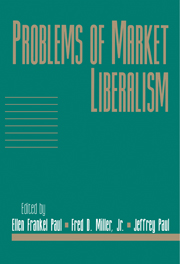Book contents
- Frontmatter
- Contents
- Introduction
- Acknowledgments
- Contributors
- Why All Welfare States (Including Laissez-Faire Ones) Are Unreasonable
- Measuring Opportunity: Toward a Contractarian Measure of Individual Interest
- Deontic Restrictions Are Not Agent-Relative Restrictions
- Why Even Egalitarians Should Favor Market Health Insurance
- Affirmative Action and the Demands of Justice
- The Dual Role of Property Rights in Protecting Broadcast Speech
- Regulation of Foods and Drugs and Libertarian Ideals: Perspectives of a Fellow-Traveler
- Profit: The Concept and Its Moral Features
- Natural Property Rights: Where They Fail
- Toward a Libertarian Theory of Class
- Libertarianism as if (the Other 99 Percent of) People Mattered
- On the Failure of Libertarianism to Capture the Popular Imagination
- Imitations of Libertarian Thought
- Index
Natural Property Rights: Where They Fail
Published online by Cambridge University Press: 26 January 2010
- Frontmatter
- Contents
- Introduction
- Acknowledgments
- Contributors
- Why All Welfare States (Including Laissez-Faire Ones) Are Unreasonable
- Measuring Opportunity: Toward a Contractarian Measure of Individual Interest
- Deontic Restrictions Are Not Agent-Relative Restrictions
- Why Even Egalitarians Should Favor Market Health Insurance
- Affirmative Action and the Demands of Justice
- The Dual Role of Property Rights in Protecting Broadcast Speech
- Regulation of Foods and Drugs and Libertarian Ideals: Perspectives of a Fellow-Traveler
- Profit: The Concept and Its Moral Features
- Natural Property Rights: Where They Fail
- Toward a Libertarian Theory of Class
- Libertarianism as if (the Other 99 Percent of) People Mattered
- On the Failure of Libertarianism to Capture the Popular Imagination
- Imitations of Libertarian Thought
- Index
Summary
INTRODUCTION
For classical liberals, natural property rights are the moral foundation of the market and of individual freedom. They determine the initial position from which persons legitimately make contracts and assess the validity of collective action. Since they establish the initial conditions of legitimate agreements, they cannot be dependent upon agreements. Persons possess these rights apart from social institutions. Natural rights typically not only prohibit interference with a person's body and mind but also forbid interference with a person's appropriation of unowned natural resources and with his freedom to do as he chooses with the products that he makes from them, so long as he does not infringe upon the equal rights of others. These rights prescribe, as Locke put it, that persons be free “to order their Actions, and dispose of their Possessions, and Persons as they think fit … without asking leave, or depending upon the Will of any other Man.”
In this essay, I argue that natural rights may fail to adjudicate the disputes that arise when one person's exercise of rights imposes costs that interfere with other persons' exercise of their rights. I also argue that natural rights may be incompatible with the non-unanimous collective decision-making procedures that are often necessary to provide a satisfactory level of public goods.
My discussion proceeds in three parts. In Section II, I consider how Locke might deal with the challenge to property rights raised by rights conflicts and by goods that require collective action. In Section III, I examine Robert Nozick's and David Gauthier's approaches to these issues.
- Type
- Chapter
- Information
- Problems of Market Liberalism , pp. 283 - 302Publisher: Cambridge University PressPrint publication year: 1998



